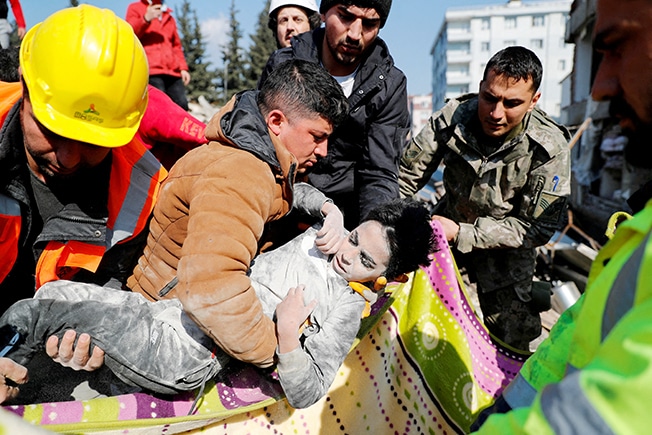The death toll from earthquakes that struck Turkey and Syria this week neared 16,000 on Thursday, as hopes faded of many people being found alive 72 hours since the disaster and frustration simmered over the slow delivery of aid.
A Turkish official said the disaster posed “very serious difficulties” to holding an election scheduled for May 14 in which President Tayyip Erdogan has been expected face the toughest challenge in his two decades in power.
On the ground, many people in Turkey and Syria spent a third night sleeping outside or in cars in freezing winter temperatures, their homes destroyed or so shaken by the quakes they were too afraid to re-enter.
The earthquake, which struck in the dead of night and was followed by powerful aftershocks, is on course to be Turkey’s deadliest since 1999, when a similarly powerful tremor killed more than 17,000.
In Turkey, footage emerged late on Wednesday of a few more survivors being rescued, including Abdulalim Muaini, who was pulled from his collapsed home in Hatay, Turkey where he had remained since Monday next to his deceased wife.
Rescue workers pulled an injured 60-year-old woman named Meral Nakir from the rubble of an apartment block in the city of Malatya, 77 hours after the first quake struck, state broadcaster TRT showed in live coverage on Thursday.
The death toll in Turkey jumped to 12,873 by Thursday morning. In Syria, already devastated by nearly 12 years of civil war, more than 3,000 people have died, according to the government and a rescue service in the rebel-held northwest.
“The death toll and injured is expected to rise much higher with many families still under collapsed buildings,” said Raed Saleh, head of the rescue service in the northwest, told Reuters on Thursday morning.
“No assistance has come yet and we are waiting today to see if any is coming,” he said.
U.N. aid into northwest Syria, a vital lifeline for 4 million people, is expected to begin flowing again on Thursday after the route was severed by the quake, aid officials said.
In Turkey, many have complained of a lack of equipment, expertise and support to rescue those trapped – sometimes even as they could hear cries for help.
Further slowing the relief effort, the main road into the Turkish city of Antakya was clogged with traffic as residents who had finally managed to find scarce gasoline sought to leave the disaster zone and aid trucks headed into the area.
After facing criticism over the response, Turkish President Tayyip Erdogan said on a visit to the disaster zone on Wednesday that operations were now working normally and promised no one would be left homeless.
One official told Reuters that it was now too early to discuss elections given 15% of Turks lived in the affected area. “At the moment there are very serious difficulties in holding an election on May 14,” as had been planned, he said.
Across a swathe of southern Turkey, people have sought temporary shelter and food in freezing winter weather, and waited in anguish by piles of rubble where family and friends might still lie buried.
“Where is the state? Where have they been for two days? We are begging them. Let us do it, we can get them out,” Sabiha Alinak said near a snow-covered collapsed building in the city of Malatya where her young relatives were trapped.
23 MILLION AFFECTED
In Syria, relief efforts are complicated by the conflict that has partitioned the nation and wrecked its infrastructure.
“There are a lot of people under the rubble there are no heavy equipment to pull them out and the voluntary teams are not able to work with light equipment,” Yousef Nahas, a resident of Salqeen in Syria’s northwest, contacted by phone.
Syria’s ambassador to the United Nations admitted the government had a “lack of capabilities and lack of equipment”, blaming more than a decade of civil war in his country and Western sanctions.
El-Mostafa Benlamlih, the top U.N. aid official in Syria, said 10.9 million people had been affected by the catastrophe in the northwestern governorates of Hama, Latakia, Idlib, Aleppo and Tartus.
Turkish officials say some 13.5 million people were affected in an area spanning roughly 450 km (280 miles) from Adana in the west to Diyarbakir in the east. In Syria, people were killed as far south as Hama, 250 km from the epicentre.
Erdogan, who declared a state of emergency in 10 provinces and sent troops to help, visited Kahramanmaras on Wednesday, where he said there had been early problems with roads and airports but “we are better today”.
Nevertheless, the disaster will pose an additional challenge to the long-ruling president in the election.
Any perception that the government is failing to address the disaster properly could hurt his prospects. Conversely, analysts say he could rally national support around the crisis response and strengthen his position.
Twitter was temporarily restricted in Turkey on Wednesday, just as the public had come to “rely on the service” in the aftermath of the disaster, the Netblocks internet observatory said.







Click here to change your cookie preferences